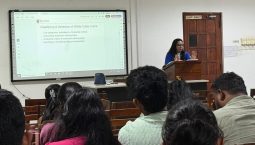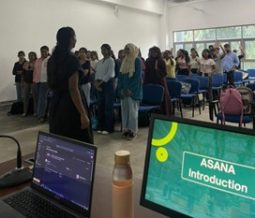The Department commenced the prestigious four-year B.Com (special) degree programme initially in all three languages namely Sinhala, Tamil, and English. Later, Tamil medium was discontinued as faculty competent of teaching degree curriculum in Tamil was not available and as a degree programme in Commerce in Tamil medium were introduced in other universities especially in the North and East of Sri Lanka. The Department was proud to run a highly reputed and successful B.Com (special) degree program in Sinhala and English medium with students initially allocated from among those sent to the Faculty of Management Studies and Commerce and afterwards directly from the University Grants Commission. The Department currently conducts its program in the English medium only. The first batch of B.Com (Special) students graduated in 1977.
The Department has a total of 500 undergraduates. The full-time academic staff of the Department is supplemented by a team of visiting lecturers holding higher academic and professional qualifications with wider experience in the industry. The Department is also being assisted in teaching other departments of the Faculty in respective specialisation areas.
As a department of higher learning, it is committed to uplift the well being of the community by producing skilful and resourceful graduates who are readily employable and competent to serve the needs of the country.
Graduate Profile
“The goal of B.Com (Special) Degree Program is to prepare its graduates to succeed in this complex and competitive global world for future challenges through intellectual autonomy, personal development and lifelong learning. A graduate of Commerce should be a competent individual who is knowledgeable, including an understanding of broad conceptual and theoretical elements and international perspectives in the fields of Commerce and Management studies. A Commerce graduate should have the capacity for critical, conceptual and reflective thinking and inquiry inclusive of an ability to evaluate and apply underlying assumptions and theories, problem identification and solving along with strategic decision-making.”

Guest Lecture on “White Collar Crime and Emerging Trends in Forensic Accounting”
The Department of Commerce, University of Sri Jayewardenepura, had the privilege of hosting Dr. Kishani Udugampola, a practitioner in the fields of financial crime and forensic accounting, for a guest lecture conducted on 3rd February 2026, for the fourth-year undergraduates of the Bachelor of Commerce (Hons) Degree Programme. Dr. Udugampola delivered an insightful and thought-provoking […]

Managerial Skill Development – Part I – January
01. “Multitasking and Managing Responsibilities Effectively” – January 12th, 2026 A session on “Multitasking and Managing Responsibilities Effectively” was conducted by Mr. Sachin Wijayasinghe, Head of the Department of Commerce. The session aimed to help students understand the concept of multitasking and its importance for both academic life and future professional roles. It focused on […]
Our Direction
“Prosper lives through learning”
To be the centre of excellence in Commerce education at University level in Sri Lanka.
In order to accomplish our mission, the Department is committed to the highest standard of learning and teaching, promotion of research and scholarship and interaction with public and private sectors to integrate theory and practice to wider society.
To impart scientific knowledge to the students to build up theoretical and practical knowledge in the field of Commerce,
To develop necessary analytical and other soft skills to perform work professionally in a demanding environment,
To encourage positive attitudes in students, which are imperative to success in learning and potential for employment,
To inculcate professional orientation through completion of professional qualifications and engaging industrial training,
To sustain enthusiasm in research by both students and staff,
To improve the contribution to postgraduate studies.